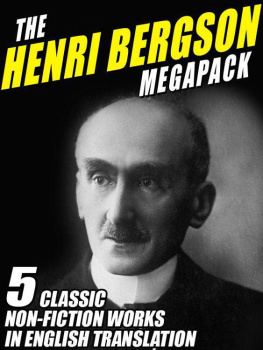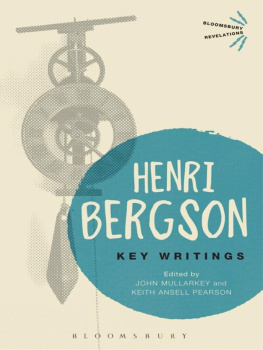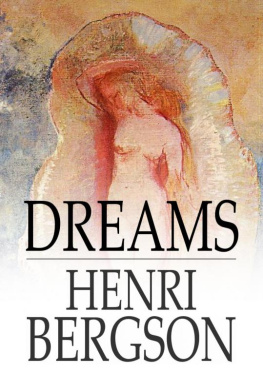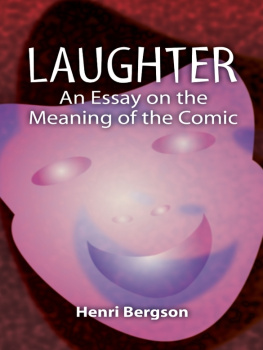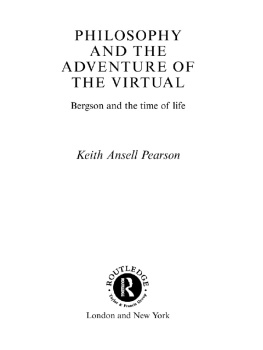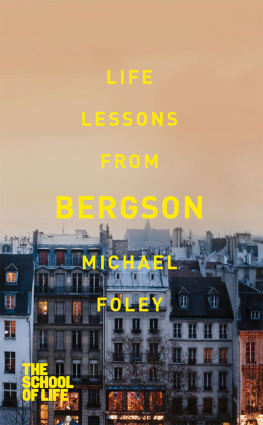Henri Bergson - The Meaning of the War / Life & Matter in Conflict
Here you can read online Henri Bergson - The Meaning of the War / Life & Matter in Conflict full text of the book (entire story) in english for free. Download pdf and epub, get meaning, cover and reviews about this ebook. year: 2005, genre: Science. Description of the work, (preface) as well as reviews are available. Best literature library LitArk.com created for fans of good reading and offers a wide selection of genres:
Romance novel
Science fiction
Adventure
Detective
Science
History
Home and family
Prose
Art
Politics
Computer
Non-fiction
Religion
Business
Children
Humor
Choose a favorite category and find really read worthwhile books. Enjoy immersion in the world of imagination, feel the emotions of the characters or learn something new for yourself, make an fascinating discovery.
- Book:The Meaning of the War / Life & Matter in Conflict
- Author:
- Genre:
- Year:2005
- Rating:3 / 5
- Favourites:Add to favourites
- Your mark:
- 60
- 1
- 2
- 3
- 4
- 5
The Meaning of the War / Life & Matter in Conflict: summary, description and annotation
We offer to read an annotation, description, summary or preface (depends on what the author of the book "The Meaning of the War / Life & Matter in Conflict" wrote himself). If you haven't found the necessary information about the book — write in the comments, we will try to find it.
The Meaning of the War / Life & Matter in Conflict — read online for free the complete book (whole text) full work
Below is the text of the book, divided by pages. System saving the place of the last page read, allows you to conveniently read the book "The Meaning of the War / Life & Matter in Conflict" online for free, without having to search again every time where you left off. Put a bookmark, and you can go to the page where you finished reading at any time.
Font size:
Interval:
Bookmark:
The Project Gutenberg EBook of The Meaning of the War, by Henri Bergson
This eBook is for the use of anyone anywhere at no cost and with
almost no restrictions whatsoever. You may copy it, give it away or
re-use it under the terms of the Project Gutenberg License included
with this eBook or online at www.gutenberg.net
Title: The Meaning of the War
Life & Matter in Conflict
Author: Henri Bergson
Commentator: H. Wildon Carr
Release Date: November 20, 2005 [EBook #17111]
Language: English
*** START OF THIS PROJECT GUTENBERG EBOOK THE MEANING OF THE WAR ***
Produced by Thierry Alberto, Henry Craig, Jeannie Howse
and the Online Distributed Proofreading Team at
http://www.pgdp.net (This file was produced from images
generously made available by The Internet Archive)
OF THE WAR
H. WILDON CARR
T. FISHER UNWIN LTD.
ADELPHI TERRACE
Second impression, July 1915
Third impression, August 1915
| Page |
| INTRODUCTION |
| LIFE AND MATTER AT WAR |
| THE FORCE WHICH WASTES AND THAT WHICH DOES NOT WASTE |
This little volume contains the discourse delivered by M. Bergson as President of the Acadmie des Sciences Morales et Politiques at its annual public meeting on December 12, 1914. It is the address which preceded the announcement of the prizes and awards bestowed by the Academy. It is now issued in book form with the consent of the author, and his full appreciation of the object, to give it the widest circulation. Although it is brief, it is a message addressed directly to the heart of our people in the crisis of war. To it is added a short article on the same theme, contributed to the Bulletin des Armes de la Rpublique, November 4, 1914.
It has been said that war, with all its terrible evils, is the occasion of at least one good which humanity values as above price: it inspires great poetry. On the other hand, it seems to crush philosophy. Many may think that in this message it is poetry to which M. Bergson is giving expression. It is, however, from the depth of his philosophy that the inspiration is drawn. The full significance of the doctrines he has been teaching, and their whole moral and political bearing, are brought into clear light, focussed, as it were, on the actual present struggle. Yet is there no word that breathes hatred to any person or to any race. It is by the triumph of a spiritual principle that philosophy may hope to free humanity from the oppression of a materialist doctrine.
The opposing principle has had, and still has, philosophers to defend it, and they belong to no particular nation or race. One of its most brilliant and influential exponents was a Frenchman, the diplomatist, Comte Joseph Arthur de Gobineau (1816-1882). A brief word on this remarkable man may help the reader to understand the mention of his name on page 30. His Essai sur l'ingalit des races humaines (1855) was the first of a series of writings to affirm, on ethnological grounds, the superiority of the Aryan race, and its right and destiny by reason of that superiority to rule all other races as bondsmen. He was the friend of Wagner, and also of Nietzsche. Madame Frster-Nietzsche in her biography of her brother has spoken of the almost reverent regard which he entertained for Gobineau, and it may be that from him Nietzsche derived the idea which he developed into his doctrine of the non-morality of the superman.
Were the discourse of M. Bergson no more than the utterance of a philosopher stirred by deep patriotic feeling to uphold his country's cause and denounce his country's foes, then, however eloquent its appeal, it would have no significance or value beyond its present power to inspire courage in the hearts of his comrades. And it would not differ from equally earnest appeals which other philosophers have addressed to the world on behalf of their fellow-countrymen. It has a much deeper meaning. It is no mere indictment of modern Germany's rulers or people. It goes to the very heart of the problem of the future of humanity. Shall the splendid material progress which has marked the scientific achievement of the last century be the forging of a sword to destroy the freedom which life has won with it from matter?
As these words are written the conflict is raging, and the decision seems still far off. Death is striking down the young in all the nations, and among them many on whom our highest hopes were founded. "But whatever be the price of victory," so writes M. Bergson to me, "it will not have been too dearly bought if humanity is finally delivered from the nightmare which weighs on it."
H. WILDON CARR
London , May 1915
"Comprendre et ne pas s'indigner": this has been said to be the last word of philosophy. I believe none of it; and, had I to choose, I should much prefer, when in presence of crime, to give my indignation rein and not to understand. Happily, the choice has not to be made. On the contrary, there are forms of anger which, by a thorough comprehension of their objects, derive the force to sustain and renew their vigour. Our anger is of that kind. We have only to detach the inner meaning of this war, and our horror for those who made it will be increased. Moreover, nothing is easier. A little history, and a little philosophy, will suffice.
For a long period Germany devoted herself to poetry, to art, to metaphysic. She was made, so she said, for thought and imagination; "she had no feeling for the reality of things." It is true that her administration had defects, that she was divided into rival states, that anarchy at certain times seemed beyond remedy. Nevertheless, an attentive study would have revealed, beneath this disorder, the normal process of life, which is always too rank at the first and later on prunes away its excess, makes its choice and adopts a lasting form. From her municipal activity there would have issued at length a good administration which would have assured order without suppressing liberty. From the closer union of the confederated states that unity in diversity, which is the distinguishing mark of organized beings, would have arisen. But time was needed for that, as it always is needed by life, in order that its possibilities may be realized.
Now, while Germany was thus working out the task of her organic self-development there was within her, or rather by her side, a people with whom every process tended to take a mechanical form. Artificiality marked the creation of Prussia; for she was formed by clumsily sewing together, edge to edge, provinces either acquired or conquered. Her administration was mechanical; it did its work with the regularity of a well-appointed machine. Not less mechanicalextreme both in precision and in powerwas the army, on which the attention of the Hohenzollerns was concentrated. Whether it was that the people had been drilled for centuries to mechanical obedience; or that an elemental instinct for conquest and plunder, absorbing to itself the life of the nation, had simplified its aims and reduced them to materialism; or that the Prussian character was originally so madeit is certain that the idea of Prussia always evoked a vision of rudeness, of rigidity, of automatism, as if everything within her went by clockwork, from the gesture of her kings to the step of her soldiers.
Font size:
Interval:
Bookmark:
Similar books «The Meaning of the War / Life & Matter in Conflict»
Look at similar books to The Meaning of the War / Life & Matter in Conflict. We have selected literature similar in name and meaning in the hope of providing readers with more options to find new, interesting, not yet read works.
Discussion, reviews of the book The Meaning of the War / Life & Matter in Conflict and just readers' own opinions. Leave your comments, write what you think about the work, its meaning or the main characters. Specify what exactly you liked and what you didn't like, and why you think so.


